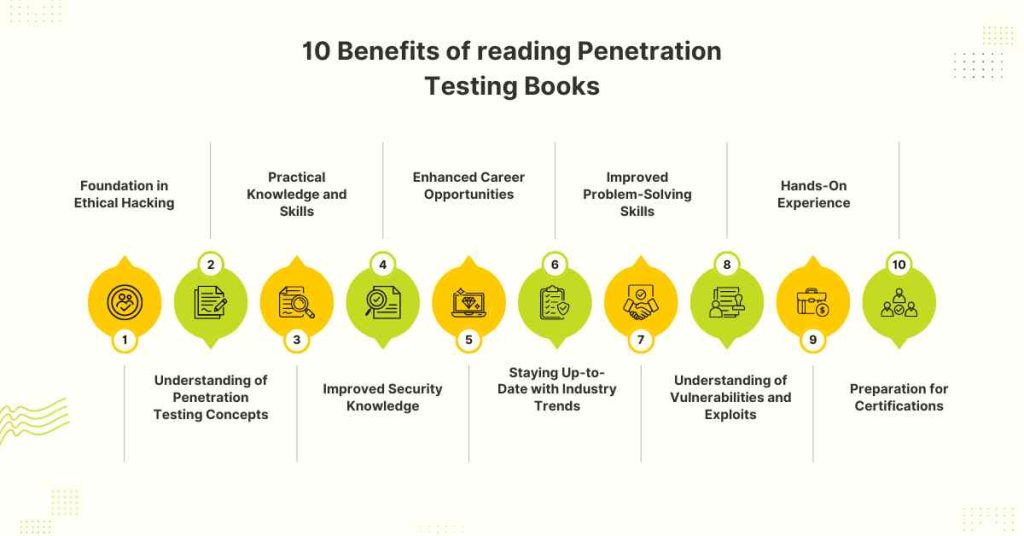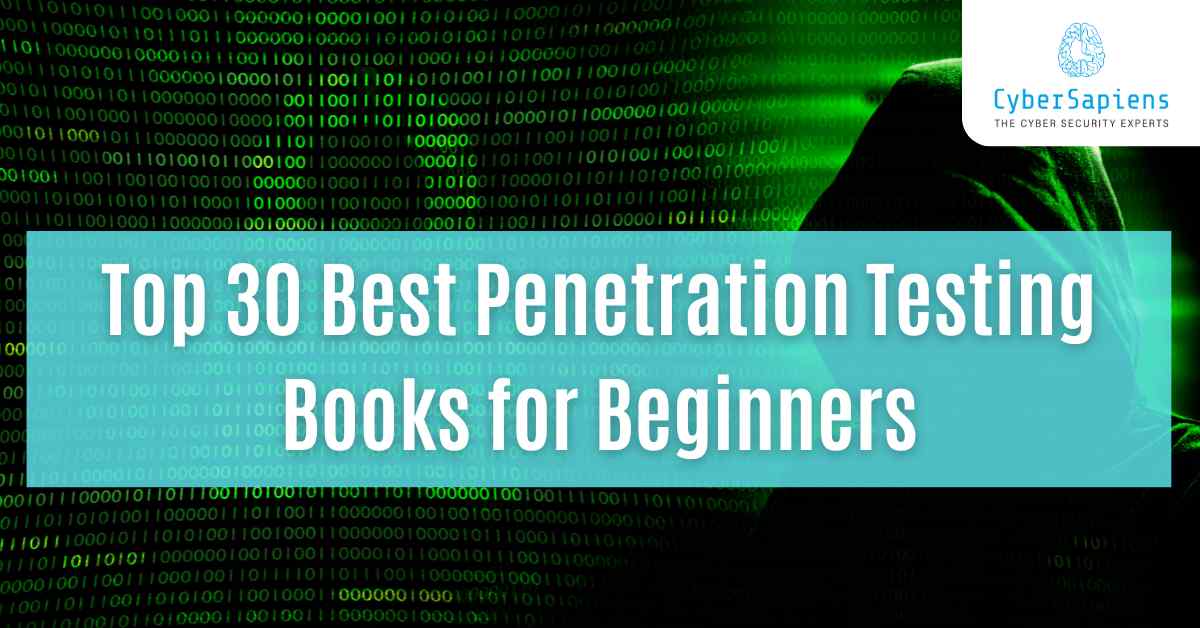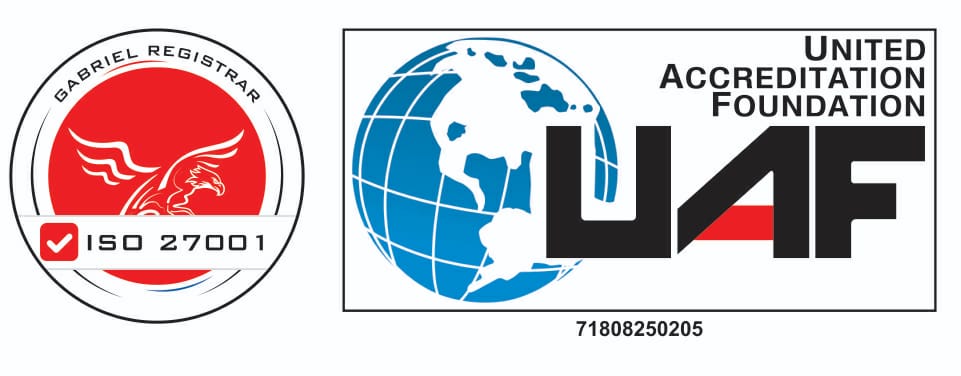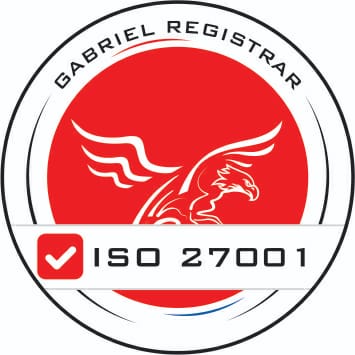With the advancement of technology in the existing world, the need for people who can perform penetration testing has risen. Penetration testing or ethical hacking is attacking computer systems, networks and applications legitimately to discover their loopholes. If you want to become a penetration tester, getting some good books is a good starting point.
Below are the top 30 best penetration testing books for beginners for those who are new to this profession. But before going into that let’s discuss why one needs to read books on penetration testing
Why Read Books on Penetration Testing?
While online courses and tutorials can be helpful, books provide a comprehensive and in-depth understanding of the subject matter. They offer a structured approach to learning, allowing you to absorb information at your own pace. Furthermore, books provide a theoretical foundation, which is essential for understanding the practical aspects of penetration testing.
List of Top 30 Best Penetration Testing Books for Beginners

The wait is over here is the list of Top 30 Best Penetration Testing Books for Beginners, with so much research and keeping our user’s interests in mind we bought you the best Best Penetration Testing Books for Beginners:
1. The Basics of Hacking and Penetration Testing by Patrick Engebretson
A beginner-friendly book that covers the fundamental concepts and techniques of ethical hacking and penetration testing.
2. Penetration Testing: A Hands-On Introduction to Hacking by Georgia Weidman
A comprehensive guide to penetration testing, covering everything from planning and reconnaissance to exploitation and post-exploitation.
3. The Hacker’s Handbook: The Essential Guide to Computer Security by Hugo Cornwall
A classic book that provides a thorough understanding of computer security and hacking concepts.
4. Penetration Testing with Kali Linux” by Offensive Security
A practical guide to using Kali Linux for penetration testing, covering various tools and techniques.

5. The Art of Exploitation by Jon Erickson
A comprehensive guide to exploitation, covering topics such as buffer overflows, shellcode, and fuzzing.
6. Metasploit: The Penetration Tester’s Guide by David Kennedy, Jim O’Gorman, Devon Kearns, and Mati Aharoni
A comprehensive guide to the Metasploit framework, a powerful tool used in penetration testing.
7. Kali Linux Revealed: Mastering the Penetration Testing Distribution by Raphael Hertzog and Jim O’Gorman
A comprehensive guide to using Kali Linux for penetration testing, covering various tools and techniques.
8. Penetration Testing: Execution and Analysis by Rafay Baloch
An introductory guide to penetration testing that gives the reader a step-by-step through the process ranging from preparation, information gathering, exploitation and reporting.
9. The Web Application Hacker’s Handbook: Finding and Exploiting Security Flaws” by Dafydd Stuttard and Marcus Pinto
A web application security manual containing topics ranging from information gathering to identification of weaknesses and attacks on the application.
10. The Penetration Tester’s Guide to Web App Security by Ryan Burnham
Web application security basics include SQL injection, cross-site scripting, cross-site request forgery and more.
11. Network Security Assessment: Know Your Network by Chris McNab
A detailed article on network security evaluation, and subtopics including, network mapping, reconnaissance, and penetration testing.
12. CompTIA Security+: SY0-601 Exam Guide by Eric Conrad and Seth Misenar
This publication is a complete reference that encompasses vital information on the CompTIA Security+ certification including the areas of network security, compliance and risk.
13. CEH Certified Ethical Hacker Study Guide by Matt Walker
A comprehensive guide to the Certified Ethical Hacker (CEH) certification, covering topics such as network security, vulnerability analysis, and penetration testing.
14. The Hacker’s Manual: A Guide to Computer Security and Penetration Testing” by A. J. Varna
An informative book on the principles involved in the protection of computers from hostile attacks and penetration testing including topics like network security, vulnerability assessment, and exploitation.
15. The Black Hat Python: Python Programming for Hackers and Pentesters” by Justin Seitz
A practical guide to using Python for penetration testing and ethical hacking, covering topics such as network programming, system administration, and web application hacking.
16. Security Assessment: Case Studies for Implementing the NSA IAM by Tony W. Daniels
A comprehensive guide to security assessment, covering topics such as network security, vulnerability analysis, and penetration testing.
17. Penetration Testing: Procedures & Methodologies by EC-Council
A comprehensive guide to the penetration testing process, covering everything from planning and scoping to reporting and remediation.
18. The Art of Intrusion: The Real Stories Behind the Exploits of Hackers, Intruders, and Deceivers” by Kevin D. Mitnick and William L. Simon
A collection of real-life stories about hackers, intruders, and deceivers, provides a unique insight into the world of penetration testing.
19. Penetration Testing: A Practical Guide to the Ethical Hacking Process” by Daniel W. Cape
A practical guide to the penetration testing process, covering everything from planning and reconnaissance to exploitation and reporting.
20. The Hacker Playbook 3: Practical Guide to Penetration Testing by Peter Kim
A comprehensive guide to practical, real-world penetration testing techniques, covering topics such as network scanning, vulnerability analysis, exploitation, and post-exploitation.
21. Gray Hat Hacking: The Ethical Hacker’s Handbook by Daniel Regalado, Billy Hoffman, Shon Harris, and Allen Harper
A comprehensive guide to ethical hacking, covering topics such as vulnerability analysis, exploitation, and post-exploitation.

22. The Penetration Tester’s Guide to Web App Security by Ryan Burnham
A practical guide to web application security, covering topics such as SQL injection, cross-site scripting, and cross-site request forgery.
23. Security Engineering: A Guide to Building Dependable Distributed Systems” by Ross Anderson
A comprehensive guide to security engineering, covering topics such as cryptography, access control, and secure systems design.
24. The Pentester Blueprint: Starting a Career as an Ethical Hacker by Phillip L. Wylie and Kim Crawley
A guide to starting a career in penetration testing, covering everything from the skills and certifications required to the job market and career paths.
25. The Hacker’s Handbook: The Essential Guide to Computer Security by James Forshaw
A comprehensive guide to computer security, covering topics such as network security, vulnerability analysis, and exploitation.
26. Penetration Testing: Essentials by EC-Council
A comprehensive guide to the essential concepts and techniques of penetration testing, covering topics such as network security, vulnerability analysis, and exploitation.
27. The Web Application Security Handbook: Finding and Exploiting Security Flaws” by Matthew Rice
A comprehensive guide to web application security, covering topics such as reconnaissance, vulnerability analysis, and exploitation.
28. Penetration Testing with Python: A Practical Guide by Dinesh S. Shenai
A practical guide to using Python for penetration testing, covering topics such as network programming, system administration, and web application hacking.
29. The Hacker’s Manual: A Guide to Computer Security and Penetration Testing by A. J. Varna
A comprehensive guide to computer security and penetration testing, covering topics such as network security, vulnerability analysis, and exploitation.
30. The Penetration Tester’s Handbook: A Comprehensive Guide to Penetration Testing by Rohit Sahu
A comprehensive guide to penetration testing, covering everything from planning and reconnaissance to exploitation and reporting.
Benefits of reading the above Top 30 Best Penetration Testing Books for Beginners

In the above, you have seen the list of Top 30 Best Penetration Testing Books for Beginners, now see the benefits of reading the above Best Penetration Testing Books:
1. Foundation in Ethical Hacking
The following books are recommended to develop a strong base for ethical hacking and penetration testing; they include coverage of network security, vulnerability, and exploitation.
2. Understanding of Penetration Testing Concepts
These books assist the readers in comprehending the strategies and methods of penetration testing, which entails planning, reconnaissance, scanning, exploitation, and reporting.
3. Practical Knowledge and Skills
Most of these books are resourceful and offer helpful knowledge and skills that one can use in the field, thus preparing the reader to be a professional penetration tester.
4. Improved Security Knowledge
This way reading these books can enhance the reader’s understanding of security concepts such as cryptography, access control and secure systems design.
5. Enhanced Career Opportunities
Learning about penetration testing and ethical hacking can make one find new jobs in the cybersecurity field like penetration tester, security consultant, and incident responder.
6. Staying Up-to-Date with Industry Trends
These books assist readers in getting recent information and trends on the subject of penetration testing and ethical hacking.
7. Improved Problem-Solving Skills
Some of the implications of penetration testing and ethical hacking include problem-solving skills, readers who go through these books can develop these skills.
8. Understanding of Vulnerabilities and Exploits
These books give a clear understanding of the different forms of weaknesses and breaches, which aims to help the reader with the prevention of possible risks.
9. Hands-On Experience
Most of these books contain exercises, cases, and examples, which make the reader put into practice the theory learnt.
10. Preparation for Certifications
This way, the books can help the readers get ready for the certifications including the CEH (Certified Ethical Hacker) and OSCP (Offensive Security Certified Professional) certifications.
Summary: Top 30 Best Penetration Testing Books for Beginners
If you are a beginner or want to learn penetration testing, then here is the list of “Top 30 Best Penetration Testing Books for Beginners“:
- The Basics of Hacking and Penetration Testing by Patrick Engebretson
- Penetration Testing: A Hands-On Introduction to Hacking by Georgia Weidman
- The Hacker’s Handbook: The Essential Guide to Computer Security by Hugo Cornwall
- Penetration Testing with Kali Linux” by Offensive Security
- The Art of Exploitation by Jon Erickson
- Metasploit: The Penetration Tester’s Guide by David Kennedy, Jim O’Gorman, Devon Kearns, and Mati Aharoni
- Kali Linux Revealed: Mastering the Penetration Testing Distribution by Raphael Hertzog and Jim O’Gorman
- Penetration Testing: Execution and Analysis by Rafay Baloch
- The Web Application Hacker’s Handbook: Finding and Exploiting Security Flaws” by Dafydd Stuttard and Marcus Pinto
- The Penetration Tester’s Guide to Web App Security by Ryan Burnham
- Network Security Assessment: Know Your Network by Chris McNab
- CompTIA Security+: SY0-601 Exam Guide by Eric Conrad and Seth Misenar
- CEH Certified Ethical Hacker Study Guide by Matt Walker
- The Hacker’s Manual: A Guide to Computer Security and Penetration Testing” by A. J. Varna
- The Black Hat Python: Python Programming for Hackers and Pentesters” by Justin Seitz
- Security Assessment: Case Studies for Implementing the NSA IAM by Tony W. Daniels
- Penetration Testing: Procedures & Methodologies by EC-Council
- The Art of Intrusion: The Real Stories Behind the Exploits of Hackers, Intruders, and Deceivers” by Kevin D. Mitnick and William L. Simon
- Penetration Testing: A Practical Guide to the Ethical Hacking Process” by Daniel W. Cape
- The Hacker Playbook 3: Practical Guide to Penetration Testing by Peter Kim
- Gray Hat Hacking: The Ethical Hacker’s Handbook by Daniel Regalado, Billy Hoffman, Shon Harris, and Allen Harper
- The Penetration Tester’s Guide to Web App Security by Ryan Burnham
- Security Engineering: A Guide to Building Dependable Distributed Systems” by Ross Anderson
- The Pentester Blueprint: Starting a Career as an Ethical Hacker by Phillip L. Wylie and Kim Crawley
- The Hacker’s Handbook: The Essential Guide to Computer Security by James Forshaw
- Penetration Testing: Essentials by EC-Council
- The Web Application Security Handbook: Finding and Exploiting Security Flaws” by Matthew Rice
- Penetration Testing with Python: A Practical Guide by Dinesh S. Shenai
- The Hacker’s Manual: A Guide to Computer Security and Penetration Testing by A. J. Varna
- The Penetration Tester’s Handbook: A Comprehensive Guide to Penetration Testing by Rohit Sahu
Conclusion
To become a professional in penetration testing one has to work hard and remain Update to date with the new technologies.
The above list of the top 30 penetration testing books for beginners will help to build the basics of Ethical Hacking and Penetration Testing concepts and methods. These books are a must for anyone who wants to get into penetration testing or anyone who wants to deepen their knowledge in the field. Happy learning!
FAQs
1. What is penetration testing?
Ans: Pen testing is the practice of simulating a cyberattack to identify vulnerabilities in a computer system or network. Ethical hackers, also known as pen testers, use various tools and techniques to exploit these weaknesses, just like malicious actors might. However, their goal is to identify and report the vulnerabilities so they can be addressed before a real attack occurs.
2. Why is pen testing important?
Ans: Pen testing helps organizations proactively identify and fix security weaknesses before they can be exploited by malicious actors. This can prevent data breaches, financial losses, and reputational damage.
3. Who needs penetration testing?
Ans: Any organization that stores sensitive data or relies on secure systems can benefit from pen testing. This includes businesses of all sizes, government agencies, and educational institutions.
4. How often should I conduct a pen test?
Ans: The frequency of pen testing depends on several factors, such as the sensitivity of your data, the size and complexity of your systems, and regulatory requirements. Generally, it’s recommended to conduct pen testing at least annually, or more frequently if there are significant changes to your systems or security posture.
5. What are the different types of penetration testing?
Ans: There are various types of pen testing, each focusing on a specific area. Common types include:
External testing: Simulates attacks from outside the organization’s network.
Internal testing: Simulates attacks from within the organization’s network.
Web application testing: Focuses on identifying vulnerabilities in web applications.
Wireless network testing: Assesses the security of wireless networks.
6. How much does a pen test cost?
Ans: The cost of a pen test can vary depending on the scope of the engagement, the experience of the pen tester, and the size and complexity of your systems. Typically, it ranges from a few thousand dollars to tens of thousands of dollars.
7. What are the risks of penetration testing?
Ans: Pen testing involves exploiting vulnerabilities, which carries a small risk of accidentally disrupting systems or causing data loss. However, reputable pen testers take precautions to minimize these risks and always work within a defined scope with the organization’s approval.
8. What skills are needed to become a pen tester?
Ans: Successful pen testers possess a strong understanding of cybersecurity concepts, networking protocols, and operating systems. They are also proficient in using pen testing tools and scripting languages like Python. Additionally, critical thinking, problem-solving, and a passion for learning are essential qualities.
9. Where can I learn more about pen testing?
Ans: There are numerous resources available to learn about pen testing, including books, online courses, and certification programs. This list provides a starting point for exploring the exciting world of ethical hacking.
10. How can I find a qualified pen tester?
Ans: Many cybersecurity companies offer pen testing services. When choosing a pen tester, consider their experience, certifications, and the specific types of testing they offer. It’s also important to ensure they are reputable and have a proven track record.












